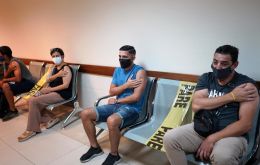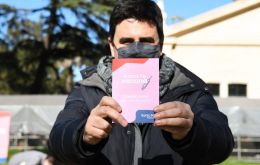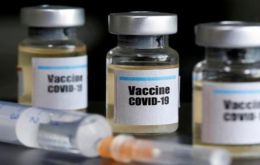MercoPress. South Atlantic News Agency
Tag: COVID-19
-
Tuesday, July 6th 2021 - 09:21 UTC
More than 50% of Uruguayans vaccinated with both doses

Uruguay's Health Minister Daniel Salinas Monday announced his country had already inoculated over half its population against SARS-Cov-2 with two doses of anticoronavirus vaccines.
-
Monday, July 5th 2021 - 09:47 UTC
Argentina: Grandmothers of Plaza de Mayo hope to find more missing grandchildren thanks to covid-19 vaccination pictures

Argentine victims of disappearances and child abductions during the military dictatorship between 1976 and 1983 are relying on vaccination efforts to help them find some of their 300 missing grandchildren.
-
Monday, July 5th 2021 - 08:47 UTC
Bringing all Argentines stranded abroad back home at a rate of 600 daily passengers might take up to five months

Argentina's Chamber of Airlines (JURCA) issued a statement over this weekend, warning that bringing back all travellers banned from reentering the country following a cap of 600 airborne passengers a day might take up to five months.
-
Saturday, July 3rd 2021 - 11:37 UTC
IATA warns Argentina may face grave consequences for banning international flights

International Air Transport Association (IATA)'s Regional Vice President for America Peter Cerda Friday said Argentina was doing just the opposite compared to the rest of the world regarding aviation services and that such mercurial management might entail unwanted consequences.
-
Saturday, July 3rd 2021 - 11:25 UTC
Argentina green lights arrival of US-developed vaccines by means of an emergency decree

Argentine President Alberto Fernández has yet again issued another emergency decree (DNU) which would allow for the purchase of anticoronavirus vaccines from suppliers other than those already cleared to be handled in the country.
-
Saturday, July 3rd 2021 - 11:07 UTC
Flybondi resumes services after pandemic-caused travel restrictions in Argentina

Argentine budget carrier Flybondi is to resume domestic services after 15 months grounded due to restrictions on the circulation of people owing to sanitary reasons, it was announced.
-
Saturday, July 3rd 2021 - 10:31 UTC
Colombian President says the rule of law has prevailed

Colombian President Iván Duque said that during the past months of political and social unrest, “the rule of law, institutionality, and democracy has prevailed,” despite the numerous cases of police brutality and human rights violations that have been reported.
-
Friday, July 2nd 2021 - 09:20 UTC
Chile's economy grows 18.1% thanks to pension withdrawals and state emergency funding

Chile's Central Bank Thursday reported an 18.1% economic growth in May, which has brought it back to the pace of prepandemic levels.
-
Friday, July 2nd 2021 - 08:56 UTC
Vaccine passport allows for reopening of Europe's internal borders as Delta variant sneaks in

The European Union has started using unanimously the so-called “vaccine passport” as a travel document that allows holders to cross through borders within the bloc.
-
Friday, July 2nd 2021 - 08:04 UTC
World Bank names new LatAm, Caribbean Chief Economist

The Washington DC headquarters of the World Bank Thursday announced William Maloney has been appointed as of July 1 as its new Chief Economist for the Latin America and the Caribbean (LAC) Region.
